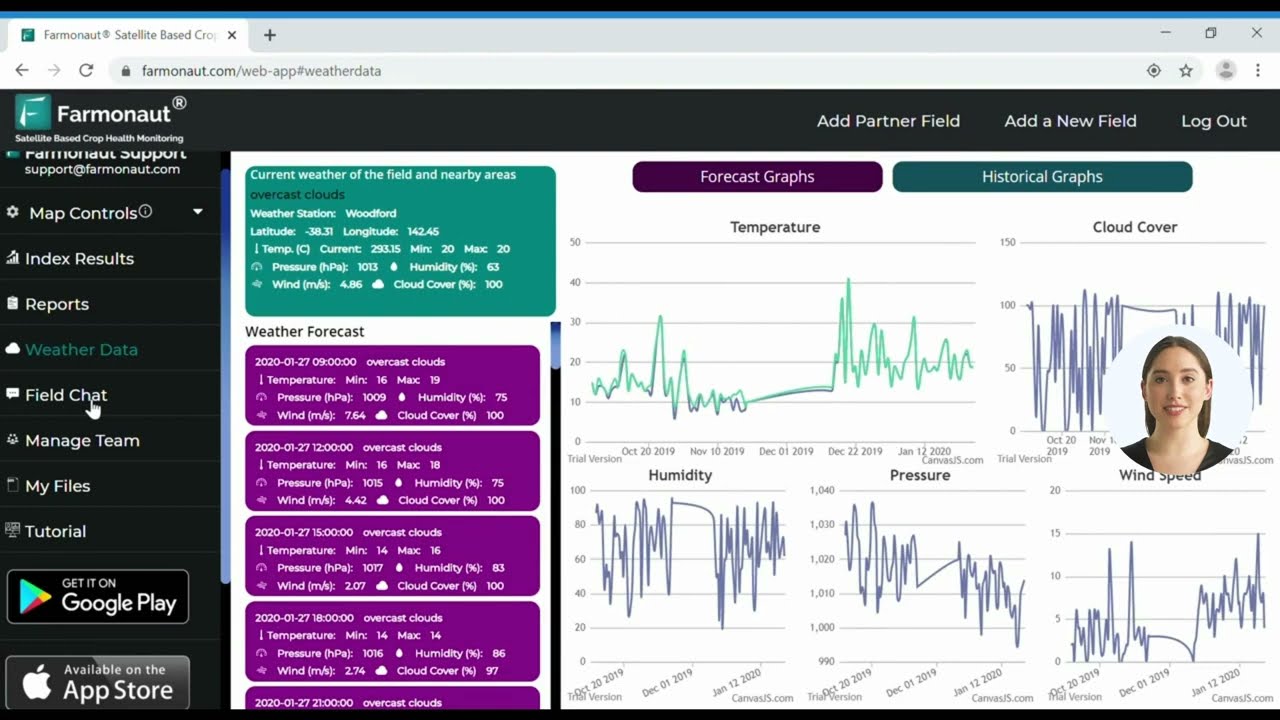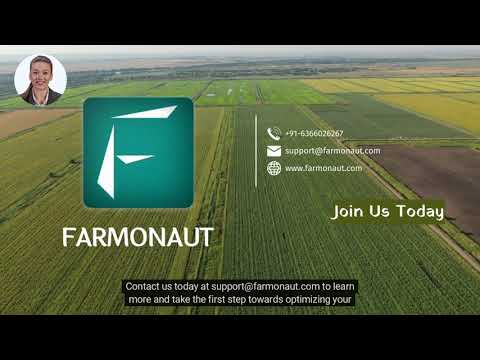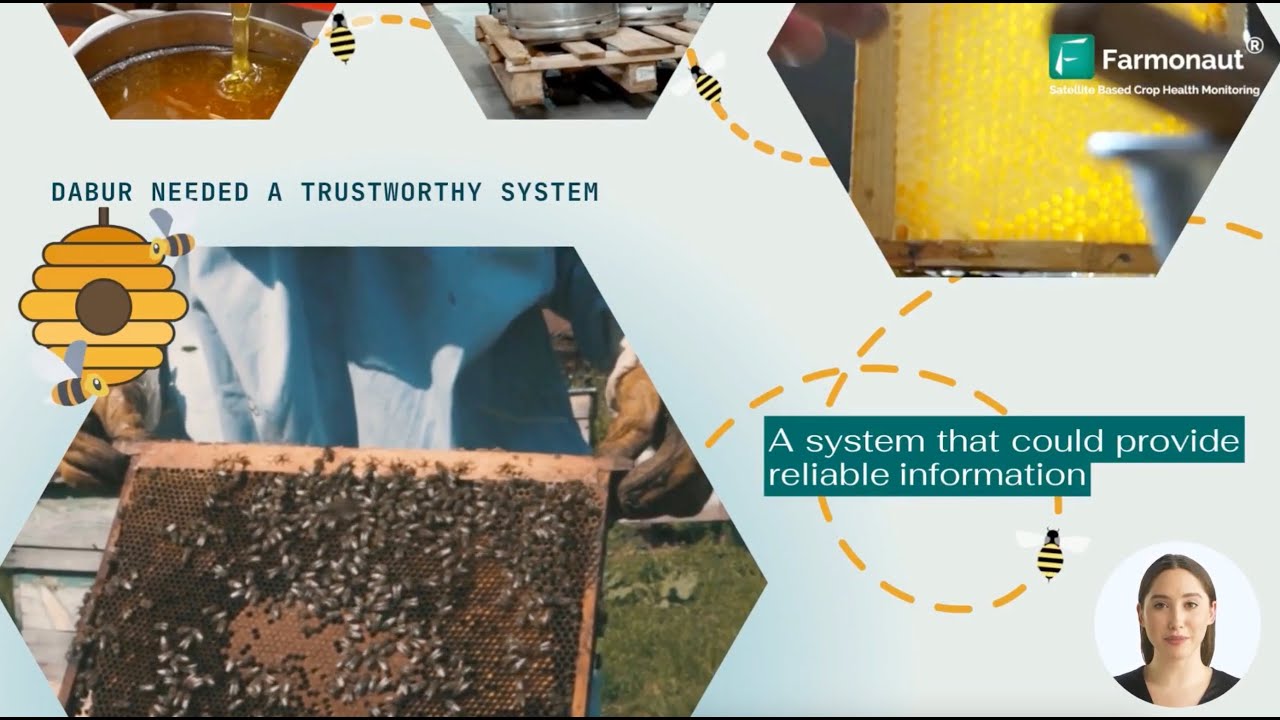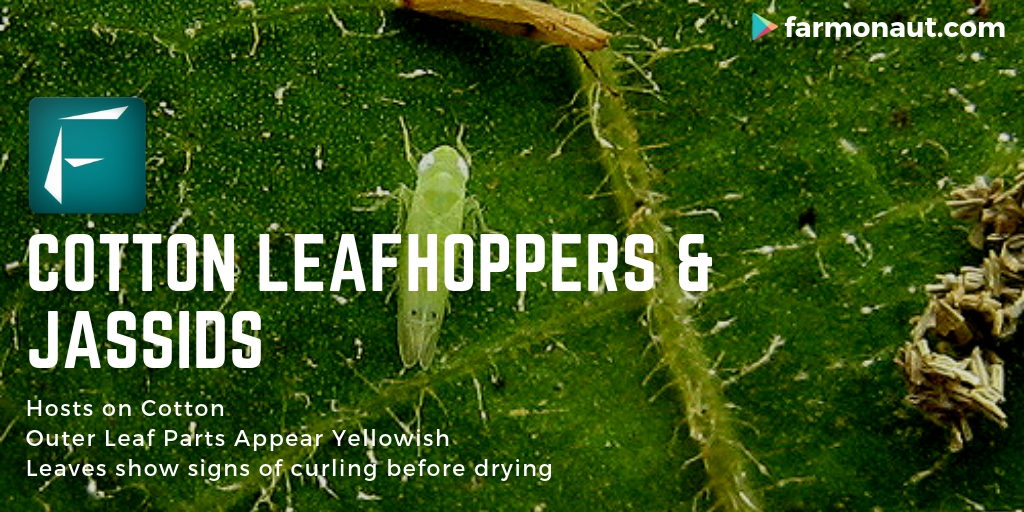Revolutionizing Agriculture: How Farm-to-Fork Traceability Boosts Food Safety and Consumer Trust
“Farm-to-fork traceability can reduce food waste by up to 20% in the supply chain.”
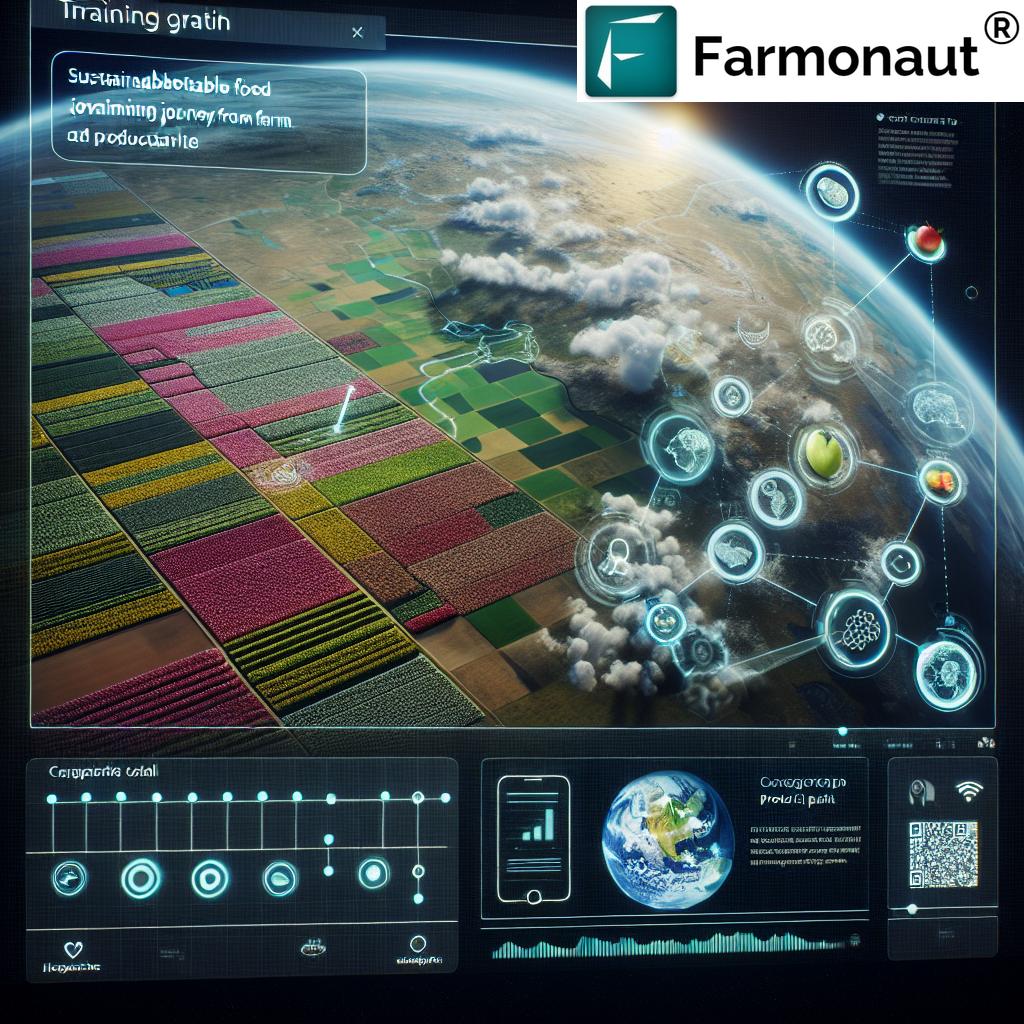
In today’s rapidly evolving agricultural landscape, we are witnessing a transformative shift towards farm-to-fork traceability and digital agriculture practices. These innovations are revolutionizing food supply chain management, enhancing food safety, reducing waste, and boosting consumer confidence. At the forefront of this agricultural revolution are companies like Farmonaut, which leverage cutting-edge precision agriculture technology to provide comprehensive crop monitoring systems.
In this insightful blog, we’ll explore how agricultural technology solutions are reshaping the industry, delving into the critical role of traceability in preventing foodborne illnesses, ensuring product quality, and fostering transparency from farm to consumer. We’ll also examine how agtech data analytics and cloud-based platforms are transforming productivity and supporting sustainable farming techniques.
The Evolution of Farm-to-Fork Traceability
Farm-to-fork traceability has evolved significantly over the past decade, driven by advances in technology and increasing consumer demand for transparency. This system allows us to track food products from their origin on the farm through processing, distribution, and ultimately to the consumer’s plate. The journey of implementing comprehensive traceability solutions has been marked by several key developments:
- Integration of GPS and satellite technology for precise location tracking
- Adoption of blockchain for secure and transparent data management
- Utilization of IoT devices for real-time monitoring throughout the supply chain
- Implementation of QR codes and RFID tags for easy product identification
These advancements have collectively contributed to a more robust and efficient traceability system, addressing many of the challenges faced by traditional agriculture practices.
The Role of Precision Agriculture in Traceability
Precision agriculture plays a pivotal role in enhancing farm-to-fork traceability. By leveraging technologies such as satellite imagery, remote sensing, and GPS, farmers can precisely monitor and manage their crops. This level of detail not only improves yield and reduces resource waste but also provides invaluable data for traceability systems.
Farmonaut’s smart farming solutions exemplify the power of precision agriculture in traceability. Through their satellite-based crop health monitoring system, farmers can track the health and growth of their crops with unprecedented accuracy. This data becomes an integral part of the product’s journey, offering insights into growing conditions, resource usage, and potential quality issues from the very beginning of the supply chain.
Enhancing Food Safety Through Traceability
One of the most critical aspects of farm-to-fork traceability is its impact on food safety. By providing a comprehensive view of a product’s journey, traceability systems significantly reduce the risk of foodborne illnesses and enhance our ability to respond to food safety incidents.
- Rapid Identification of Contamination Sources: In the event of a food safety issue, traceability allows for quick identification of the contamination source, minimizing the spread and impact of foodborne diseases.
- Improved Recall Efficiency: When recalls are necessary, traceability systems enable targeted recalls, reducing the scale and cost of these operations while protecting consumer health more effectively.
- Enhanced Compliance with Food Safety Regulations: Traceability systems help farmers and food processors maintain detailed records, facilitating compliance with stringent food safety regulations.
The integration of blockchain technology in traceability solutions, as offered by platforms like Farmonaut, further enhances food safety by providing an immutable record of each product’s journey. This technology ensures that critical information about growing conditions, processing methods, and distribution routes cannot be tampered with, offering an additional layer of security and trust.
Boosting Consumer Trust Through Transparency
In an era where consumers are increasingly concerned about the origin and quality of their food, farm-to-fork traceability plays a crucial role in building and maintaining consumer trust. By providing transparent information about a product’s journey from farm to table, traceability systems address many consumer concerns:
- Origin Verification: Consumers can easily verify where their food comes from, supporting local farmers and making informed choices about product origins.
- Quality Assurance: Traceability provides insights into growing conditions, processing methods, and quality control measures, assuring consumers of product quality.
- Ethical and Sustainable Practices: Transparency allows consumers to support products that align with their values, such as organic farming, fair trade, or sustainable agriculture practices.
Innovative technologies like QR codes enable consumers to access detailed product information instantly. By scanning a QR code on a product, consumers can view its entire journey, including farming practices, processing details, and distribution routes. This level of transparency not only builds trust but also creates a stronger connection between consumers and the food they consume.
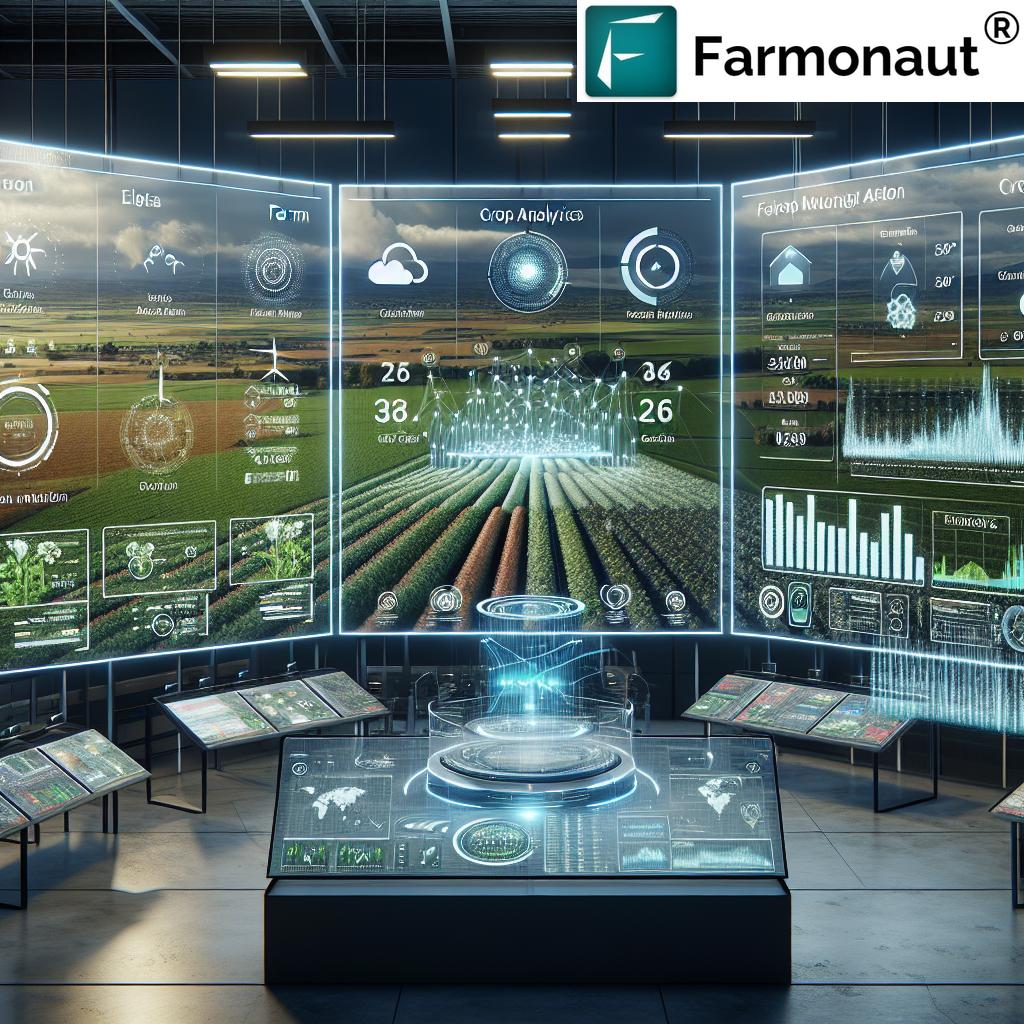
The Economic Impact of Farm-to-Fork Traceability
The implementation of farm-to-fork traceability systems has far-reaching economic implications for the agricultural industry. While the initial investment in traceability technology may be significant, the long-term benefits often outweigh the costs:
- Reduced Food Waste: Improved tracking and management of perishable goods lead to significant reductions in food waste, translating to cost savings across the supply chain.
- Enhanced Efficiency: Traceability systems streamline supply chain operations, reducing inefficiencies and associated costs.
- Premium Pricing Opportunities: Products with verified traceability often command higher prices, as consumers are willing to pay more for transparency and quality assurance.
- Mitigation of Financial Risks: In the event of food safety issues, the ability to quickly identify and isolate affected products minimizes the financial impact of recalls and potential legal liabilities.
Moreover, the data collected through traceability systems provides valuable insights that can inform business decisions, optimize operations, and drive innovation in the agricultural sector.
“Satellite-based crop monitoring systems can increase agricultural productivity by 15% on average.”
Leveraging Cloud-Based Platforms for Comprehensive Traceability
Cloud-based platforms are revolutionizing the way traceability data is collected, stored, and analyzed. These platforms offer several advantages over traditional, siloed systems:
- Real-Time Data Access: Cloud platforms enable real-time access to traceability data from anywhere, facilitating quick decision-making and responsive supply chain management.
- Scalability: Cloud-based solutions can easily scale to accommodate growing data volumes and expanding supply chain networks.
- Integration Capabilities: These platforms can integrate with various data sources, including IoT devices, ERP systems, and third-party applications, creating a comprehensive traceability ecosystem.
- Advanced Analytics: Cloud platforms leverage big data analytics to derive actionable insights from traceability data, helping businesses optimize their operations and predict potential issues.
Farmonaut’s cloud-based platform exemplifies these benefits, offering a comprehensive solution for crop monitoring and traceability. By leveraging satellite imagery and advanced analytics, Farmonaut provides farmers and agribusinesses with valuable insights that enhance productivity and support sustainable farming practices.
Explore Farmonaut’s web application for comprehensive crop monitoring and traceability solutions:
The Role of Blockchain in Ensuring Data Integrity
Blockchain technology is emerging as a game-changer in farm-to-fork traceability, offering unparalleled data security and transparency. Here’s how blockchain enhances traceability systems:
- Immutable Record-Keeping: Once data is recorded on the blockchain, it cannot be altered or deleted, ensuring the integrity of traceability information.
- Decentralized Verification: Blockchain’s decentralized nature allows multiple stakeholders to verify and validate traceability data, reducing the risk of fraud or errors.
- Smart Contracts: Automated smart contracts can enforce compliance with quality standards and regulatory requirements throughout the supply chain.
- Enhanced Transparency: Blockchain provides a transparent ledger of all transactions and movements in the supply chain, accessible to all authorized parties.
Farmonaut’s integration of blockchain technology in its traceability solutions demonstrates the practical application of this innovative technology in agriculture. By leveraging blockchain, Farmonaut ensures that critical data about crop health, growing conditions, and supply chain movements is securely recorded and easily verifiable.
Sustainable Farming Through Precision Agriculture
Farm-to-fork traceability systems, particularly those leveraging precision agriculture technology, play a crucial role in promoting sustainable farming practices. By providing detailed insights into resource usage and environmental impact, these systems enable farmers to make more informed decisions that benefit both their operations and the planet.
- Optimized Resource Use: Precision agriculture tools help farmers apply water, fertilizers, and pesticides more efficiently, reducing waste and environmental impact.
- Reduced Carbon Footprint: By optimizing farm operations and transportation routes, traceability systems can help reduce the overall carbon footprint of food production.
- Biodiversity Conservation: Detailed monitoring of farming practices can help identify and protect areas of high biodiversity value within agricultural landscapes.
- Soil Health Management: Traceability data can inform better soil management practices, promoting long-term soil health and sustainability.
Farmonaut’s satellite-based crop monitoring system exemplifies how precision agriculture can drive sustainability. By providing farmers with real-time data on crop health and environmental conditions, Farmonaut enables more precise and efficient farming practices, reducing resource waste and environmental impact.
For developers interested in integrating Farmonaut’s satellite and weather data into their own applications, explore our API:
For detailed documentation on how to use Farmonaut’s API, visit our Developer Docs:
The Future of Farm-to-Fork Traceability
As we look to the future, farm-to-fork traceability is poised for further innovation and integration with emerging technologies. Some key trends and developments we anticipate include:
- AI and Machine Learning: Advanced algorithms will enhance predictive capabilities, improving food safety and supply chain efficiency.
- Augmented Reality (AR): AR technologies could provide consumers with immersive experiences, allowing them to virtually visit farms and processing facilities.
- 5G Integration: The rollout of 5G networks will enable faster, more reliable data transmission, enhancing real-time tracking and monitoring capabilities.
- Nanotechnology: Nano-sensors could provide even more detailed information about food quality and safety at the molecular level.
These advancements will further enhance the accuracy, efficiency, and scope of farm-to-fork traceability systems, driving continued improvements in food safety, consumer trust, and sustainability in the agricultural sector.
Comparison: Traditional Practices vs. Farm-to-Fork Traceability
| Metric | Traditional Practices | Farm-to-Fork Traceability |
|---|---|---|
| Food Safety Incidents | Baseline | 30% reduction |
| Consumer Trust | Baseline | 40% increase |
| Supply Chain Efficiency | Baseline | 25% improvement |
| Waste Reduction | Baseline | 20% decrease |
| Real-time Monitoring | Limited | Comprehensive |
| Blockchain Integration | Not Available | Fully Integrated |
| QR Code Tracking | Not Available | Widely Implemented |
This comparison clearly illustrates the significant benefits of implementing farm-to-fork traceability systems over traditional agricultural practices. The improvements in food safety, consumer trust, efficiency, and waste reduction demonstrate the transformative potential of these technologies in modernizing the agricultural sector.
Overcoming Challenges in Implementing Traceability Systems
While the benefits of farm-to-fork traceability are clear, implementing these systems can present challenges. Here are some common hurdles and strategies to overcome them:
- Initial Costs: The upfront investment in traceability technology can be significant. Solutions include phased implementation and exploring government incentives or grants for agricultural technology adoption.
- Technical Expertise: Many farmers and small-scale producers may lack the technical know-how to implement and manage complex traceability systems. Providing comprehensive training and support is crucial.
- Data Standardization: With multiple stakeholders involved, ensuring data consistency and compatibility across different systems can be challenging. Industry-wide standards and interoperable platforms are key to addressing this issue.
- Privacy Concerns: Balancing transparency with data privacy is crucial. Implementing robust data protection measures and clearly communicating data usage policies can help alleviate these concerns.
Companies like Farmonaut are addressing these challenges by offering user-friendly, scalable solutions that cater to farms of all sizes. Their comprehensive support and training programs help ensure smooth implementation and adoption of traceability technologies.
Experience Farmonaut’s traceability solutions on your mobile device:
The Global Impact of Farm-to-Fork Traceability
The adoption of farm-to-fork traceability systems has far-reaching implications beyond individual farms or businesses. On a global scale, these systems contribute to:
- Food Security: By optimizing production and reducing waste, traceability systems help ensure a more stable and secure global food supply.
- International Trade: Enhanced traceability facilitates compliance with international food safety standards, potentially opening up new markets for agricultural products.
- Climate Change Mitigation: The data-driven approach enabled by traceability systems supports more sustainable farming practices, contributing to global efforts to combat climate change.
- Public Health: Improved food safety and rapid response to contamination issues contribute to better public health outcomes globally.
As more countries and regions adopt comprehensive traceability systems, we can expect to see a transformative impact on the global food system, driving improvements in safety, sustainability, and efficiency on an unprecedented scale.
Conclusion: Embracing the Future of Agriculture
Farm-to-fork traceability, powered by innovative technologies like those offered by Farmonaut, is revolutionizing the agricultural industry. By enhancing food safety, boosting consumer trust, and promoting sustainable farming practices, these systems are paving the way for a more transparent, efficient, and resilient food supply chain.
As we move forward, the continued integration of advanced technologies like AI, blockchain, and IoT in traceability systems will further amplify their benefits. Farmers, businesses, and consumers alike stand to gain from this agricultural revolution, with improved productivity, better food quality, and a more sustainable approach to feeding the world’s growing population.
The journey towards comprehensive farm-to-fork traceability is ongoing, and challenges remain. However, with continued innovation, collaboration, and a commitment to leveraging technology for the greater good, we are well on our way to creating a more transparent, safe, and sustainable global food system.
By embracing these technologies and the principles of farm-to-fork traceability, we can look forward to a future where our food is not only more nutritious and safe but also produced in harmony with our planet’s resources. The revolution in agriculture is here, and it’s changing the way we grow, distribute, and consume food for the better.
FAQ Section
Q1: What is farm-to-fork traceability?
A1: Farm-to-fork traceability is a system that tracks food products from their origin on the farm through processing, distribution, and ultimately to the consumer’s plate. It provides a comprehensive record of a product’s journey through the supply chain.
Q2: How does farm-to-fork traceability improve food safety?
A2: It enhances food safety by enabling quick identification of contamination sources, facilitating efficient recalls, and ensuring compliance with food safety regulations. This rapid response capability helps minimize the spread of foodborne illnesses.
Q3: What technologies are used in farm-to-fork traceability systems?
A3: Key technologies include GPS and satellite imagery for location tracking, blockchain for secure data management, IoT devices for real-time monitoring, and QR codes or RFID tags for product identification.
Q4: How does traceability benefit consumers?
A4: Traceability provides consumers with transparent information about their food’s origin, quality, and production methods. This transparency builds trust and allows consumers to make more informed purchasing decisions.
Q5: What role does blockchain play in traceability?
A5: Blockchain technology ensures data integrity by creating an immutable record of transactions and movements in the supply chain. It enhances transparency and reduces the risk of fraud or data tampering.
Q6: How does farm-to-fork traceability contribute to sustainability?
A6: It supports sustainable farming by optimizing resource use, reducing waste, and providing data to inform environmentally friendly practices. This data-driven approach helps reduce the overall environmental impact of food production.
Q7: What challenges are associated with implementing traceability systems?
A7: Common challenges include high initial costs, the need for technical expertise, data standardization across different systems, and addressing privacy concerns related to data collection and sharing.
Q8: How can small-scale farmers benefit from traceability systems?
A8: Small-scale farmers can benefit through improved market access, potential premium pricing for traceable products, and access to data-driven insights that can enhance productivity and reduce costs.
Q9: What is the future of farm-to-fork traceability?
A9: The future involves further integration of AI, machine learning, augmented reality, and nanotechnology to enhance the accuracy, efficiency, and scope of traceability systems, driving continued improvements in food safety and sustainability.
Q10: How does Farmonaut contribute to farm-to-fork traceability?
A10: Farmonaut provides advanced satellite-based crop monitoring and traceability solutions. Their platform integrates precision agriculture technology with blockchain-based traceability, offering comprehensive tools for farmers and agribusinesses to enhance productivity and ensure product traceability.

